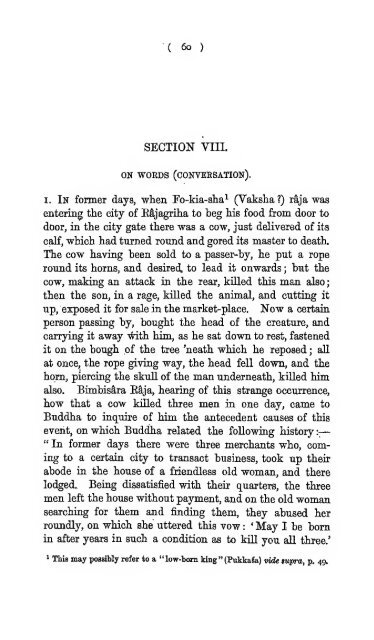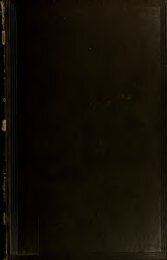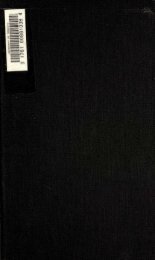Texts from the Buddhist canon : commonly known as Dhammapada
Texts from the Buddhist canon : commonly known as Dhammapada
Texts from the Buddhist canon : commonly known as Dhammapada
You also want an ePaper? Increase the reach of your titles
YUMPU automatically turns print PDFs into web optimized ePapers that Google loves.
•( 6o )<br />
SECTION VIII.<br />
ON WORDS (CONYEESATION).<br />
I. In former days, when To-kia-sha^ (Vaksha?) rSja w<strong>as</strong><br />
entering <strong>the</strong> city of ESjagriha to beg his food <strong>from</strong> door to<br />
door, in <strong>the</strong> city gate <strong>the</strong>re w<strong>as</strong> a cow, just delivered of its<br />
calf, which had turned round and gored its m<strong>as</strong>ter to death.<br />
The cow having been sold to a p<strong>as</strong>ser-by, he put a rope<br />
round its horns, and desired, to lead it onwards ; but <strong>the</strong><br />
cow, making an attack in <strong>the</strong> rear, killed this man also<br />
<strong>the</strong>n <strong>the</strong> son, in a rage, killed <strong>the</strong> animal, and cutting it<br />
up, exposed it for sale in <strong>the</strong> market-place. Now a certain<br />
person p<strong>as</strong>sing by, bought <strong>the</strong> head of <strong>the</strong> creature, and<br />
carrying it away ^th him, <strong>as</strong> he sat down to rest, f<strong>as</strong>tened<br />
it on <strong>the</strong> bough of <strong>the</strong> tree 'neath which he reposed ; all<br />
at once, <strong>the</strong> rope giving way, <strong>the</strong> head fell down, and <strong>the</strong><br />
horn, piercing <strong>the</strong> skull of <strong>the</strong> man underneath, killed him<br />
also. Bimbis§,ra E§,ja, hearing of this stremge occurrence,<br />
how that a cow killed three men in one day, came to<br />
Buddha to inquire of him <strong>the</strong> antecedent causes of this<br />
event, on which Buddha related <strong>the</strong> following history :-—<br />
" In former days <strong>the</strong>re were three merchants who, com-<br />
ing to a certain city to transact business, took up <strong>the</strong>ir<br />
abode in <strong>the</strong> house of a friendless old woman, and <strong>the</strong>re<br />
lodged. Being dissatisfied with <strong>the</strong>ir quarters, <strong>the</strong> three<br />
men left <strong>the</strong> house without payment, and on <strong>the</strong> old woman<br />
searching for <strong>the</strong>m and finding <strong>the</strong>m, <strong>the</strong>y abused her<br />
roundly, on which she uttered this vow :<br />
' May I be born<br />
in after years in such a condition <strong>as</strong> to kiU you. all three.'<br />
* This may possibly refer to a "low-bom king " (PukkaSa) vide tupra, p. 49.<br />
;





